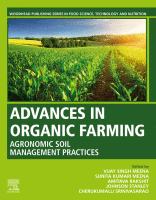Browse content
Table of contents
Actions for selected chapters
- Full text access
- Book chapterAbstract only
Chapter 1 - Concept and global scenario of organic farming
Dibakar Mahanta, J.K. Bisht and Lakshmi Kant
Pages 1-16 - Book chapterAbstract only
Chapter 2 - Conservation agricultural practices under organic farming
Agniva Mandal, Salwinder Singh Dhaliwal, ... Amardeep Singh Toor
Pages 17-37 - Book chapterAbstract only
Chapter 3 - Soil fertility management in organic farming
Prabhakar Barnwal, Shiva Devika, ... Amitava Rakshit
Pages 39-46 - Book chapterAbstract only
Chapter 4 - Microbial community structure in organic farming and their management
Anandkumar Naorem, Jaison Maverick, ... Shiva Kumar Udayana
Pages 47-58 - Book chapterAbstract only
Chapter 5 - Use of microbial biostimulants in organic farming
Neeshu Joshi, Hanuman Prasad Parewa, ... Varsha Gupta
Pages 59-73 - Book chapterAbstract only
Chapter 6 - Remediation of salt affected soils through microbes to promote organic farming
Anandkumar Naorem and Shiva Kumar Udayana
Pages 75-92 - Book chapterAbstract only
Chapter 7 - Improving soil micronutrient availability under organic farming
Salwinder Singh Dhaliwal, Vivek Sharma, ... Gayatri Verma
Pages 93-114 - Book chapterAbstract only
Chapter 8 - Organic plant nutrient, protection and production management
L.C. De, Tulipa De, ... N.S. Kalaivanan
Pages 115-131 - Book chapterAbstract only
Chapter 9 - Role of biofertilizers and biopesticides in organic farming
Hanuman Prasad Parewa, Neeshu Joshi, ... Lokesh Kumar Jain
Pages 133-159 - Book chapterAbstract only
Chapter 10 - Toward the mitigation of biotic and abiotic stresses through plant growth promoting rhizobacteria
Hossein Zahedi
Pages 161-172 - Book chapterAbstract only
Chapter 11 - Organic seed production and certification with special reference to Rajasthan
Kailash Chandra, Subhash Chand, ... Gaytri Kumawat
Pages 173-190 - Book chapterAbstract only
Chapter 12 - Organic vegetable production and its impact on soil, environment and society
Kumari Shubha, N. Raju Singh, ... Ramnath K. Ray
Pages 191-208 - Book chapterAbstract only
Chapter 13 - Toward the organic product certification: Participatory Guarantee System (PGS) in the certification process and the contribution of Ecovida Agroecology Network
Luciano Zanetti Pessôa Candiotto
Pages 209-222 - Book chapterAbstract only
Chapter 14 - Challenges and prospective trends of various industrial and solid wastes incorporated with sustainable green concrete
Salmabanu Luhar, Ismail Luhar, ... Kamarudin Hussin
Pages 223-240 - Book chapterAbstract only
Chapter 15 - Conventional versus organic farming: Nutrient status
Neha Chausali and Jyoti Saxena
Pages 241-254 - Book chapterNo access
Index
Pages 255-260
About the book
Description
Advances in Organic Farming: Agronomic Soil Management Practices focuses on the integrated interactions between soil-plant-microbe-environment elements in a functioning ecosystem. It explains sustainable nutrient management under organic farming and agriculture, with chapters focusing on the role of nutrient management in sustaining global ecosystems, the remediation of polluted soils, conservation practices, degradation of pollutants, biofertilizers and biopesticides, critical biogeochemical cycles, potential responses for current and impending environmental change, and other critical factors. Organic farming is both challenging and exciting, as its practice of “feeding the soil, not the plant” provides opportunity to better understand why some growing methods are preferred over others.
In the simplest terms, organic growing is based on maintaining a living soil with a diverse population of micro and macro soil organisms. Organic matter (OM) is maintained in the soil through the addition of compost, animal manure, green manures and the avoidance of excess mechanization.
Advances in Organic Farming: Agronomic Soil Management Practices focuses on the integrated interactions between soil-plant-microbe-environment elements in a functioning ecosystem. It explains sustainable nutrient management under organic farming and agriculture, with chapters focusing on the role of nutrient management in sustaining global ecosystems, the remediation of polluted soils, conservation practices, degradation of pollutants, biofertilizers and biopesticides, critical biogeochemical cycles, potential responses for current and impending environmental change, and other critical factors. Organic farming is both challenging and exciting, as its practice of “feeding the soil, not the plant” provides opportunity to better understand why some growing methods are preferred over others.
In the simplest terms, organic growing is based on maintaining a living soil with a diverse population of micro and macro soil organisms. Organic matter (OM) is maintained in the soil through the addition of compost, animal manure, green manures and the avoidance of excess mechanization.
Key Features
- Presents a comprehensive overview of recent advances and new developments in the field OF research within a relevant theoretical framework
- Highlights the scope of the inexpensive and improved management practices
- Focuses on the role of nutrient management in sustaining the ecosystems
- Presents a comprehensive overview of recent advances and new developments in the field OF research within a relevant theoretical framework
- Highlights the scope of the inexpensive and improved management practices
- Focuses on the role of nutrient management in sustaining the ecosystems
Details
ISBN
978-0-12-822358-1
Language
English
Published
2021
Copyright
Copyright © 2021 Elsevier Inc. All rights reserved.
Imprint
Woodhead Publishing
